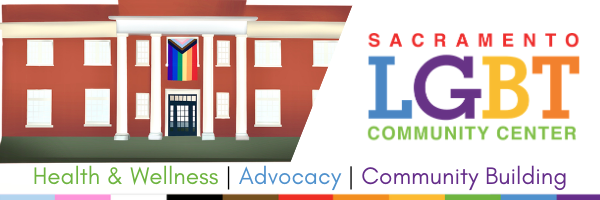Dear Center Community:
Like many other organizations, The Sacramento LGBT Community Center shares the unprecedented challenges and disruptions caused by the COVID-19 pandemic, which magnifies the impact of systemic racism on the health and wellness of the communities we serve.
We joined the calls for action that the murders of Breonna Taylor and George Floyd, and shooting of Jacob Blake at the hands of law enforcement brought to the streets this summer. The disparate impact of police violence on Black lives has created a national moment of reckoning, and the Center has taken this time to reexamine the structural ways we have contributed to a system that could clearly do more to value Black lives. We acknowledge that as leaders in the Sacramento community, it is our responsibility to go beyond examining our own shortcomings and to join our community across the country to advocate for the justice we have yet to achieve collectively. We mourn for our transgender siblings, Tony McDade, Dominique “Rem’mie” Fells, Riah Milton, Jayne Thompson, Selena Reyes-Hernandez, Queasha Hardy, Tiffany Harris, and Brian Powers, among more than 33 mostly Black transgender or gender diverse people violently murdered this year.
As an LGBTQ+ community service provider, we recognize that racial equity is critical to serving our community as the Center strives to provide high quality and effective services. We acknowledge that past decisions have caused harm and that racial bias goes beyond simply an issue of individual animus towards Black, Indigenous and People of Color (BIPOC), and instead manifests itself as a pattern in the policies, practices and everyday operations of organizations and institutions. The patterns that drive racial inequity often occur unconsciously, but are the responsibility of an organization’s leadership and staff to identify and change, as the negative impact on community members, particular those of color, can be severe. Ultimately, this means that if we fail to address racial inequity within our organization, we fall short of our mission and vision to create a region where every LGBTQ+ community member can thrive.
The Center’s board of directors and staff have prioritized our effort to progress the Center as an anti-racist organization, starting with the creation of an internal racial equity committee and the engagement of external consultants that will guide our work, beginning with a series of trainings to normalize the practice of explicitly examining how we can better address systemic racism and advance racial equity in the communities we serve.
In addition, the Center has listened to the concerns of Black community members who say that the unexpected presence of law enforcement at the Center’s facilities and events has hindered them from coming to us for help or participating in community events. Our first priority is to provide trauma-informed care in our community, and we understand that the Center cannot provide its services most effectively, until we can center and support Black lives in spaces that do not include law enforcement. In Sacramento County, Black people comprise 9% of the population, but 31% of arrests and 33% of people killed or seriously injured by law enforcement. In the City of Sacramento, Black people comprised 40% of all arrests and 52% of people killed or seriously injured by law enforcement.
To effectively support our community, we need to offer our clients a measure of protection from these inequities where we can. Doing so requires us to reflect on what we have heard from our Black community members about how the Center has failed them, particularly in times of tension and trauma that surround interactions with law enforcement.
The Center has a long-existing internal policy prohibiting weapons in its facilities and at Center events, and it has been our recent practice to call law enforcement only as a last resort, since we believe there are community-based alternatives to calling the police in non-emergent circumstances that provide safer and more supportive outcomes. However, these existing policies and practices have not prevented the most marginalized in our communities from involuntary encounters with armed and uniformed law enforcement at Center facilities and events.
To minimize these involuntary encounters, the Center’s Board of Directors voted to establish a policy to no longer allow armed, uniformed law enforcement officers at Center facilities or events, unless as a last resort or in a true emergency, and as otherwise required by law or permitting regulation.
Further, to maintain a safe and welcoming environment for all guests at Center events, we have formally requested that the City of Sacramento allow alternatives to police vehicles and uniformed officers for road closures and safety at permitted special events in the City, such as the Pride Festival, that ensure the safety of all guests. We have also requested that the City recognize the annual Pride March as a free speech event, and thus no longer bill the Center for road closures and safety services.
As the Sacramento Police Department and other law enforcement agencies work to earn the trust of the communities they serve to protect, we acknowledge their pledge not to participate in uniform at the 2020 Pride March and Festival before in-person events were cancelled due to COVID-19. Officers and their families who wish to participate in programming at the Center and at our events in the future, including SacPride, will continue to be welcomed along with other LGBTQ+ and allied community members.
The Center will also continue to advocate on behalf of victims of crime and if necessary, meet law enforcement off-site or online in support of our clients in filing criminal complaints or providing witness testimony. We will continue to hold the Sacramento Police Department accountable to fulfilment of its 2019 commitments to the LGTBQ+ community, which include creating and supporting an LGBTQ+ community advisory committee, holding LGBTQ+ community forums, and implementing policy and practice reforms that place greater value on Black, Indigenous, queer, trans and other people of color. Our advocacy has already resulted in Sac PD’s implementation of new officer training, participation in healing circles and an LGBTQ+ community virtual town hall, expanded LGBTQ+ liaison positions, and work on a new policy on interactions with transgender and gender diverse people.
We recognize that there is so much more work to do, and this is just the beginning. The Center will continue to engage in dialogue over the coming months with community members and stakeholders, including Black LGBTQ+ leaders, as to how we can better serve the Black community. Together, we can use this period of disruption and self-reflection, as individuals, families, organizations and institutions, to seek a path forward and demonstrate that Black lives DO matter.
In Solidarity,
The Board of Directors and CEO
The Sacramento LGBT Community Center


